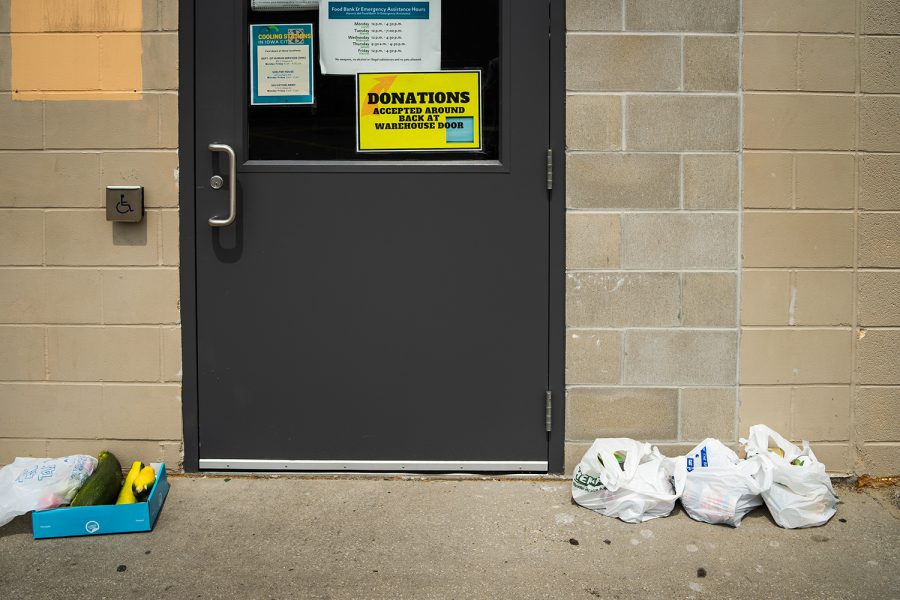Jaimes: SNAP benefits fail to meet needs of recipients
A look into the benefits of the Crisis Center of Johnson County.
Donations sit outside the door to the Food Bank for the Crisis Center of Johnson Coutny on Sunday, Aug. 19, 2018. The Food Bank allows Johnson County residents to accept grocery assistance once per week.
November 12, 2018
“Fifteen meals from a $5 rotisserie chicken” read a Pinterest article that intrigued me. I was searching for recipes that wouldn’t break the bank on a college budget.
“This will do” I thought as a sad reality hit me. My younger brother, who worked at a deli his last year of high school, was the first to inform me about the luxuries of hot food that Supplemental Nutrition Assistance Program recipients are denied. He told me that because prepared food was not covered by food stamps, most people could not afford to purchase hot food unless it was on sale.
In researching the reasoning behind this, I found that food stamps pay for the food being purchased, not food being prepared for others. This logic is understandable, but something about demonizing hot food into the same category such as beer and liquor seems like quite a punishment for customers of lower economic status. Strict guidelines surrounding SNAP may demonstrate that moral decisions cannot come from the hands of the government.
RELATED: Crisis Center collects donations for toilet paper drive
SNAP benefits have recently made national headlines as the Trump administration proposed new work requirements, requiring recipients to work 20 hours a week or part-time. The administration does not address the guidelines to what food stamps can and cannot buy. For those whose needs go beyond what food stamps can provide, Crisis Centers and food pantries in local communities may be a better fit.
Described as “a volunteer-driven organization that provides immediate and nonjudgmental support for individuals facing emotional, food, or financial crisis,” the Johnson County Crisis Center aims to provide relief for those in need. Its Food Bank supplies nonperishable items, produce, bakery, deli, dairy, and health and hygiene when they are donated by others in the community. It provides weekly assistance with no limit to the number of weeks, per year, one can visit.
The Crisis Center also provides a monthly mobile food pantry to residents of rural areas of Johnson County. This allows recipients to receive perishable and nonperishable food, baby, and household items. The only limitation is on the number of items per household size. The center prioritizes the needs of recipients rather than placing conditions on goods given to them.
RELATED: Kumar: Fresh produce and food insecurity
Volunteer-based groups such as the Crisis Center rely on donations and assistance through businesses, private donors, philanthropic organizations, and the religious community. It does not reach the scope of residents that the federal government can, so it is important that communities reach out to programs such as these to ensure that the center can meet the needs of recipients in a way that does not look down on them and can specialize programs to the needs of the community. It is remarkable to see the lives touched by crisis centers that do not dehumanize recipients.
It is also important to note crisis centers, like that of Johnson County, can make the difference in a holiday meal that SNAP benefits cannot manage. $25 can provide a holiday meal for a family sharing the same community as you. Consider doing your part when higher levels of government cannot do theirs.






